because是从属连词
because,_since,_as,_for作为原因的区别
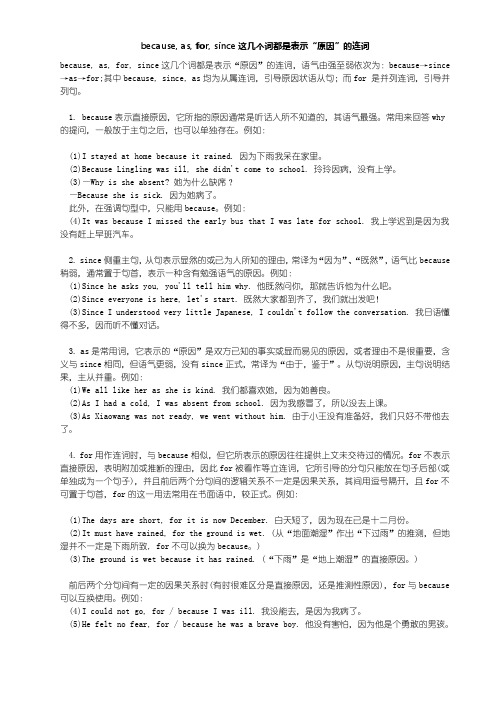
because, as, for, since这几个词都是表示“原因”的连词because, as, for, since这几个词都是表示“原因”的连词,语气由强至弱依次为:because→since →as→for;其中because, since, as均为从属连词,引导原因状语从句;而for 是并列连词,引导并列句。
1. because表示直接原因,它所指的原因通常是听话人所不知道的,其语气最强。
常用来回答why 的提问,一般放于主句之后,也可以单独存在。
例如:(1)I stayed at home because it rained. 因为下雨我呆在家里。
(2)Because Lingling was ill, she didn't come to school. 玲玲因病,没有上学。
(3)—Why is she absent? 她为什么缺席?—Because she is sick. 因为她病了。
此外,在强调句型中,只能用because。
例如:(4)It was because I missed the early bus that I was late for school. 我上学迟到是因为我没有赶上早班汽车。
2. since侧重主句,从句表示显然的或已为人所知的理由,常译为“因为”、“既然”,语气比because 稍弱,通常置于句首,表示一种含有勉强语气的原因。
例如:(1)Since he asks you, you'll tell him why. 他既然问你,那就告诉他为什么吧。
(2)Since everyone is here, let's start. 既然大家都到齐了,我们就出发吧!(3)Since I understood very little Japanese, I couldn't follow the conversation. 我日语懂得不多,因而听不懂对话。
四因为as_because_for_since用法区别
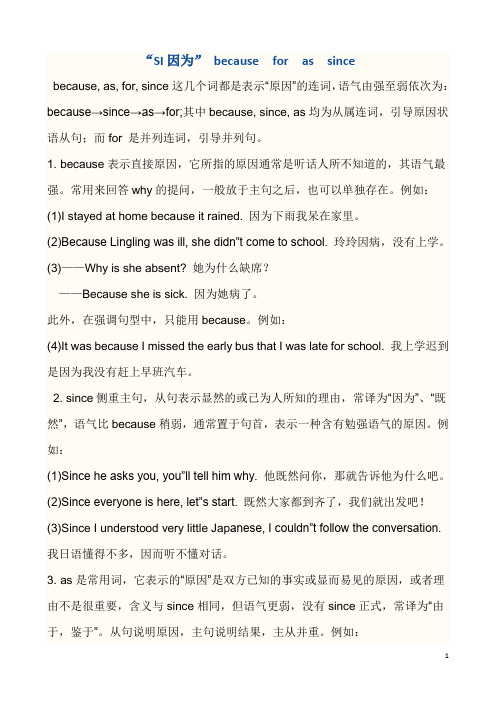
“SI因为”because for as sincebecause, as, for, since这几个词都是表示“原因”的连词,语气由强至弱依次为:because→since→as→for;其中because, since, as均为从属连词,引导原因状语从句;而for 是并列连词,引导并列句。
1. because表示直接原因,它所指的原因通常是听话人所不知道的,其语气最强。
常用来回答why的提问,一般放于主句之后,也可以单独存在。
例如:(1)I stayed at home because it rained. 因为下雨我呆在家里。
(2)Because Lingling was ill, she didn”t come to school. 玲玲因病,没有上学。
(3)——Why is she absent? 她为什么缺席?——Because she is sick. 因为她病了。
此外,在强调句型中,只能用because。
例如:(4)It was because I missed the early bus that I was late for school. 我上学迟到是因为我没有赶上早班汽车。
2. since侧重主句,从句表示显然的或已为人所知的理由,常译为“因为”、“既然”,语气比because稍弱,通常置于句首,表示一种含有勉强语气的原因。
例如:(1)Since he asks you, you”ll tell him why. 他既然问你,那就告诉他为什么吧。
(2)Since everyone is here, let”s start. 既然大家都到齐了,我们就出发吧!(3)Since I understood very little Jap anese, I couldn”t follow the conversation. 我日语懂得不多,因而听不懂对话。
3. as是常用词,它表示的“原因”是双方已知的事实或显而易见的原因,或者理由不是很重要,含义与since相同,但语气更弱,没有since正式,常译为“由于,鉴于”。
since,because,as的区别
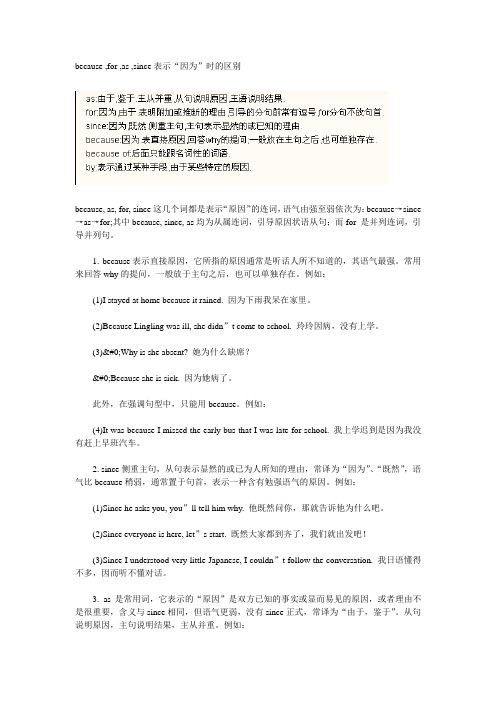
because ,for ,as ,since表示“因为”时的区别because, as, for, since这几个词都是表示“原因”的连词,语气由强至弱依次为:because→since →as→for;其中because, since, as均为从属连词,引导原因状语从句;而for 是并列连词,引导并列句。
1. because表示直接原因,它所指的原因通常是听话人所不知道的,其语气最强。
常用来回答why的提问,一般放于主句之后,也可以单独存在。
例如:(1)I stayed at home because it rained. 因为下雨我呆在家里。
(2)Because Lingling was ill, she didn”t come to school. 玲玲因病,没有上学。
(3)�Why is she absent? 她为什么缺席?�Because she is sick. 因为她病了。
此外,在强调句型中,只能用because。
例如:(4)It was because I missed the early bus that I was late for school. 我上学迟到是因为我没有赶上早班汽车。
2. since侧重主句,从句表示显然的或已为人所知的理由,常译为“因为”、“既然”,语气比because稍弱,通常置于句首,表示一种含有勉强语气的原因。
例如:(1)Since he asks you, you”ll tell him why. 他既然问你,那就告诉他为什么吧。
(2)Since everyone is here, let”s start. 既然大家都到齐了,我们就出发吧!(3)Since I understood very little Japanese, I couldn”t follow the conversation. 我日语懂得不多,因而听不懂对话。
because, since, as, for作为原因的区别
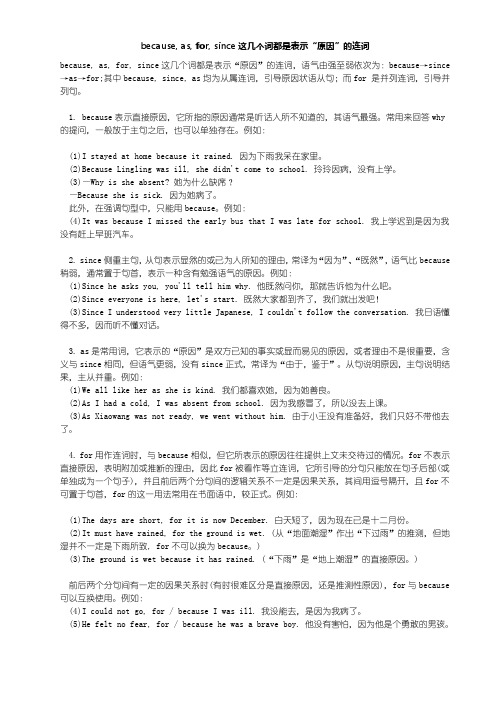
because, as, for, since这几个词都是表示“原因”的连词because, as, for, since这几个词都是表示“原因”的连词,语气由强至弱依次为:because→since →as→for;其中because, since, as均为从属连词,引导原因状语从句;而for 是并列连词,引导并列句。
1. because表示直接原因,它所指的原因通常是听话人所不知道的,其语气最强。
常用来回答why 的提问,一般放于主句之后,也可以单独存在。
例如:(1)I stayed at home because it rained. 因为下雨我呆在家里。
(2)Because Lingling was ill, she didn't come to school. 玲玲因病,没有上学。
(3)—Why is she absent? 她为什么缺席?—Because she is sick. 因为她病了。
此外,在强调句型中,只能用because。
例如:(4)It was because I missed the early bus that I was late for school. 我上学迟到是因为我没有赶上早班汽车。
2. since侧重主句,从句表示显然的或已为人所知的理由,常译为“因为”、“既然”,语气比because 稍弱,通常置于句首,表示一种含有勉强语气的原因。
例如:(1)Since he asks you, you'll tell him why. 他既然问你,那就告诉他为什么吧。
(2)Since everyone is here, let's start. 既然大家都到齐了,我们就出发吧!(3)Since I understood very little Japanese, I couldn't follow the conversation. 我日语懂得不多,因而听不懂对话。
because,的用法
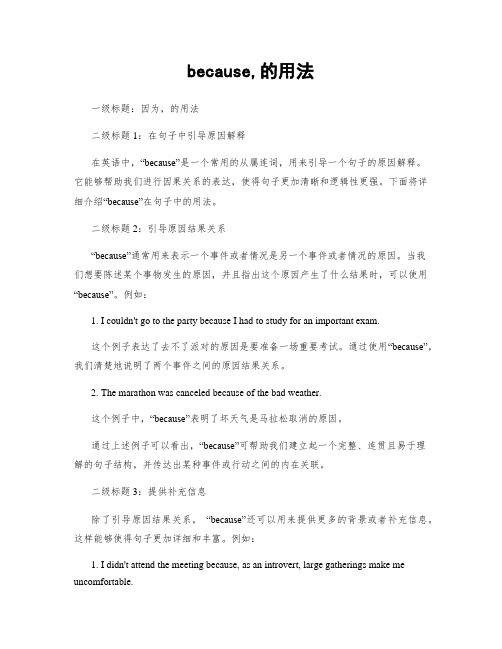
because,的用法一级标题:因为,的用法二级标题1:在句子中引导原因解释在英语中,“because”是一个常用的从属连词,用来引导一个句子的原因解释。
它能够帮助我们进行因果关系的表达,使得句子更加清晰和逻辑性更强。
下面将详细介绍“because”在句子中的用法。
二级标题2:引导原因结果关系“because”通常用来表示一个事件或者情况是另一个事件或者情况的原因。
当我们想要陈述某个事物发生的原因,并且指出这个原因产生了什么结果时,可以使用“because”。
例如:1. I couldn't go to the party because I had to study for an important exam.这个例子表达了去不了派对的原因是要准备一场重要考试。
通过使用“because”,我们清楚地说明了两个事件之间的原因结果关系。
2. The marathon was canceled because of the bad weather.这个例子中,“because”表明了坏天气是马拉松取消的原因。
通过上述例子可以看出,“because”可帮助我们建立起一个完整、连贯且易于理解的句子结构,并传达出某种事件或行动之间的内在关联。
二级标题3:提供补充信息除了引导原因结果关系,“because”还可以用来提供更多的背景或者补充信息。
这样能够使得句子更加详细和丰富。
例如:1. I didn't attend the meeting because, as an introvert, large gatherings make me uncomfortable.这个例子中,“because”在提供原因的同时,进一步解释了个人性格特点,以此说明为什么不参加会议。
2. She decided to quit her job as a teacher because she wanted to pursue her passion for painting.这个例子中,“because”不仅表达了辞职的原因,还额外向读者传达了她对绘画的热情。
because引导的状语从句
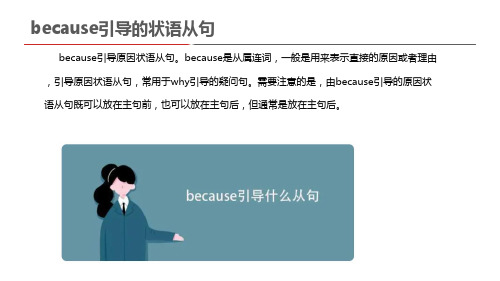
注意: “not …… because”结构中的not否定的是because引导的整个从 此外要注意because不能与so连用: 汉语习惯上说“因为…所以…”,但英语习惯上却不能将 so与because 连用: 因为下雨,所以我们得Байду номын сангаас在家里。
正:Because it was raining, we stayed at home./It was raining, so we stayed at home.
because引导的原因状语从句一般放于主句的后面,because从句位于句首时要用逗号分 开,放在句末 时,可不用逗号分开。because表示直接原因, 语气最强, 最适合回答why 引导的疑问句。
because引导的状语从句
例如: (1) I do it because I like it.
我做这件事是因为我喜欢。
原因状语从句,顾名思义,是用来解释某件事发生的原因。最常用的一个从属连词叫作 because,常用来强调原因,尤其在阅读篇章汇总,because一词之后通常是关键信息。比 如Because the weather was bad, we will canceled the picnic. 这里,because就是非常 正式在解释原因。
because引导的状语从句
because引导原因状语从句。because是从属连词,一般是用来表示直接的原因或者理由 ,引导原因状语从句,常用于why引导的疑问句。需要注意的是,由because引导的原因状 语从句既可以放在主句前,也可以放在主句后,但通常是放在主句后。
because引导的状语从句
Because of和because的区别

Because of和because的区别because是从属连词,后接原因状语从句。
because of 是个短语介词,不可以引导原因状语从句,而应该接名词、代词、动词的ing形式或者名词性从句等。
Because of和because的区别1区别because of和because一、读音不同1.because读音:英[bɪˈkəz] 美[bɪˈkəz]2.because of读音:英[bɪˈkɒz əv] 美[bɪˈkɔːz əv]二、含义不同1.because释义:conj.因为。
2.because of释义:conj.因为,由于(说明)because of 是复合介词,其后可接名词、代词、动名词或由what 引导的从句(但不是直接接从句)。
三、用法不同1.because用法:because是从属连词,后接原因状语从句。
2.because of用法:because of是个短语介词,不可以引导原因状语从句,而应该接名词,代词等。
2because of双语例句They are here because of us.他们是因为我们来这里的。
We have had to raise our prices because of rising costs.因为成本日益上涨,我们不得不提高价格。
His school work is suffering because of family problems.由于家庭问题,他的学业日渐退步。
Two players are out of the team because of injury.两名队员因伤退出了比赛。
No payments were made last week because of a computer error.由于计算机出错,上周未付任何款项。
英语重点词汇辨析because,because of,since,as for
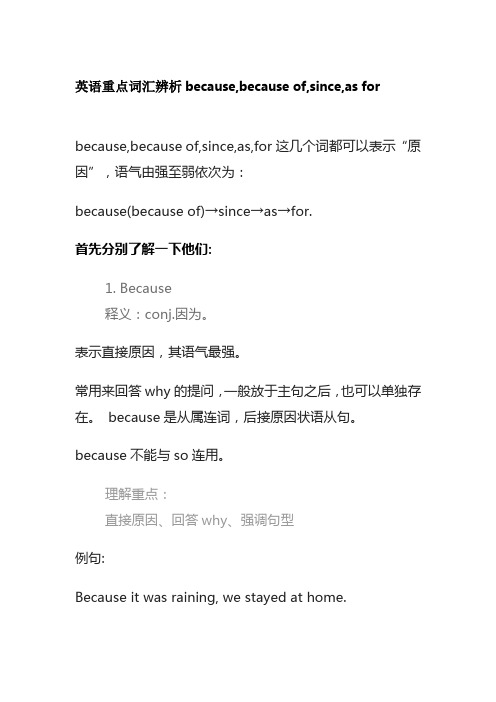
英语重点词汇辨析because,because of,since,as forbecause,because of,since,as,for这几个词都可以表示“原因”,语气由强至弱依次为:because(because of)→since→as→for.首先分别了解一下他们:1. Because释义:conj.因为。
表示直接原因,其语气最强。
常用来回答why的提问,一般放于主句之后,也可以单独存在。
because是从属连词,后接原因状语从句。
because不能与so连用。
理解重点:直接原因、回答why、强调句型例句:Because it was raining, we stayed at home.因为下雨,所以我们得呆在家里。
Why you choose this sport?你为什么选择这项运动?He left because he didn't want to be tagged as a soap star.他之所以离开是因为他不想被人称作是肥皂剧明星。
2.Because of释义:conj.因为,由于(说明)表示直接原因,其语气最强。
because of是个介词短语,不可以引导原因状语从句,而应该接名词、代词、动词的ing形式或者名词性从句等。
理解重点:直接原因例句:Because of my country accent, people identified me with a homely farmer's wife.由于我的乡下口音,人们将我等同于平常的农妇。
The team might be seeded because of their pull within soccer's international body.凭其在国际足球机构的影响力,该队有可能被定为种子队。
Many quite reasonable people were at panic stations because of popular unrest.许多相当理智的人由于普遍的不安情绪也处于紧张状态。
语法详解:表示原因的连词及其用法

语法详解:表示原因的连词及其用法because, as, for, since这几个词都是表示“原因”的连词,语气由强至弱依次为:because→since→as→for;其中because, since, as均为从属连词,引导原因状语从句;而for 是并列连词,引导并列句。
1. because表示直接原因,它所指的原因通常是听话人所不知道的,其语气最强。
常用来回答why的提问,一般放于主句之后,也可以单独存在。
例如:(1)I stayed at home because it rained. 因为下雨我呆在家里。
(2)Because Lingling was ill, she didn't come to school. 玲玲因病,没有上学。
(3)—Why is she absent 她为什么缺席—Because she is sick. 因为她病了。
此外,在强调句型中,只能用because。
例如:(4)It was because I missed the early bus that I was late for school. 我上学迟到是因为我没有赶上早班汽车。
2. since侧重主句,从句表示显然的或已为人所知的理由,常译为“因为”、“既然”,语气比because稍弱,通常置于句首,表示一种含有勉强语气的原因。
例如:(1)Since he asks you, you'll tell him why. 他既然问你,那就告诉他为什么吧。
(2)Since everyone is here, let's start. 既然大家都到齐了,我们就出发吧!(3)Since I understood very little Japanese, I couldn't follow the conversation. 我日语懂得不多,因而听不懂对话。
3. as是常用词,它表示的“原因”是双方已知的事实或显而易见的原因,或者理由不是很重要,含义与since相同,但语气更弱,没有since正式,常译为“由于,鉴于”。
because是连词吗
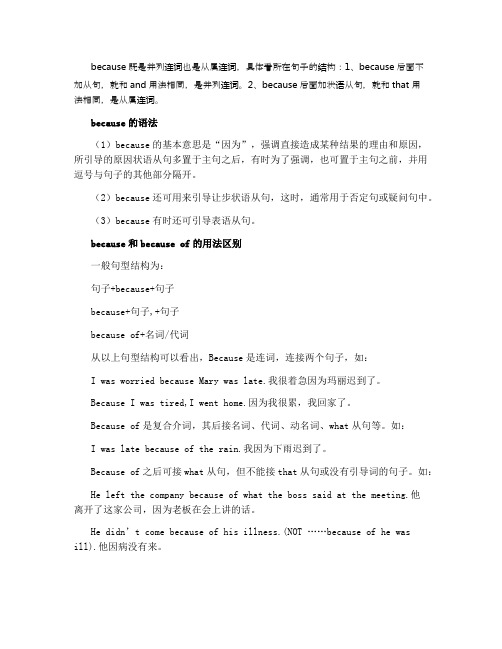
because既是并列连词也是从属连词,具体看所在句子的结构:1、because后面不加从句,就和and用法相同,是并列连词。
2、because后面加状语从句,就和that用法相同,是从属连词。
because的语法(1)because的基本意思是“因为”,强调直接造成某种结果的理由和原因,所引导的原因状语从句多置于主句之后,有时为了强调,也可置于主句之前,并用逗号与句子的其他部分隔开。
(2)because还可用来引导让步状语从句,这时,通常用于否定句或疑问句中。
(3)because有时还可引导表语从句。
because和because of的用法区别一般句型结构为:句子+because+句子because+句子,+句子because of+名词/代词从以上句型结构可以看出,Because是连词,连接两个句子,如:I was worried because Mary was late.我很着急因为玛丽迟到了。
Because I was tired,I went home.因为我很累,我回家了。
Because of是复合介词,其后接名词、代词、动名词、what从句等。
如:I was late because of the rain.我因为下雨迟到了。
Because of之后可接what从句,但不能接that从句或没有引导词的句子。
如:He left the company because of what the boss said at the meeting.他离开了这家公司,因为老板在会上讲的话。
He didn’t come because of his illness.(NOT ……because of he was ill).他因病没有来。
because、 as、 for和 now that区别大解析

because, as, for, since这几个词都是表示“原因”的连词,语气由强至弱依次为:because→since→as→for;其中because, since, as均为从属连词,引导原因状语从句;而for 是并列连词,引导并列句。
1. because表示直接原因,它所指的原因通常是听话人所不知道的,其语气最强。
常用来回答why的提问,一般放于主句之后,也可以单独存在。
例如:(1)I stayed at home because it rained. 因为下雨我呆在家里。
(2)Because Lingling was ill, she didn't come to school.玲玲因病,没有上学。
(3)—Why is she absent? 她为什么缺席?—Because she is sick. 因为她病了。
此外,在强调句型中,只能用because。
例如:(4)It was because I missed the early bus that I was late for school. 我上学迟到是因为我没有赶上早班汽车。
2. since侧重主句,从句表示显然的或已为人所知的理由,常译为“因为”、“既然”,语气比because稍弱,通常置于句首,表示一种含有勉强语气的原因。
例如:(1)Since he asks you, you'll tell him why. 他既然问你,那就告诉他为什么吧。
(2)Since everyone is here, let's start. 既然大家都到齐了,我们就出发吧!(3)Since I understood very little Japanese, I couldn't follow the conversation. 我日语懂得不多,因而听不懂对话。
3. as是常用词,它表示的“原因”是双方已知的事实或显而易见的原因,或者理由不是很重要,含义与since相同,但语气更弱,没有since 正式,常译为“由于,鉴于”。
because是从属连词
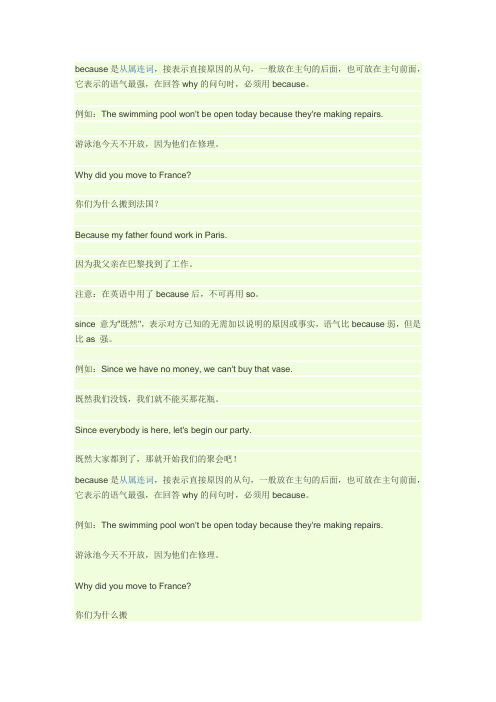
because是从属连词,接表示直接原因的从句,一般放在主句的后面,也可放在主句前面,它表示的语气最强,在回答why的问句时,必须用because。
例如:The swimming pool won't be open today because they're making repairs.游泳池今天不开放,因为他们在修理。
Why did you move to France?你们为什么搬到法国?Because my father found work in Paris.因为我父亲在巴黎找到了工作。
注意:在英语中用了because后,不可再用so。
since 意为"既然",表示对方已知的无需加以说明的原因或事实,语气比because弱,但是比as 强。
例如:Since we have no money, we can't buy that vase.既然我们没钱,我们就不能买那花瓶。
Since everybody is here, let's begin our party.既然大家都到了,那就开始我们的聚会吧!because是从属连词,接表示直接原因的从句,一般放在主句的后面,也可放在主句前面,它表示的语气最强,在回答why的问句时,必须用because。
例如:The swimming pool won't be open today because they're making repairs.游泳池今天不开放,因为他们在修理。
Why did you move to France?你们为什么搬hide-hid-hidden ride-rode-ridden write-wrote-written forg et-forgot-forgotten*5.过去分词由过去式加-n构成break-broke-broken choose-chose-chosen freeze-froze-frozen speak-spoke-spoken steal-stole-stolen6.完全不规则形式am /is-was-been are-were-been fly-flew-flown lie-lay-lain wear-wore-worn二.过去式与过去分词形式相同bring-brought-brought build-built-built buy-bought-boughtcatch-caught-caughtdig-dug-dug feel-felt-felt find-found-foundget-got-gothave /has-had-had hold-held-held keep-kept-kept leave-left-left lay-laid-laid lend-lent-lent lose-lost-lost pay-pa id-paidhear-heard -heard make-made-made mean-meant-meant me et-met-metsay-said-said sell-sold-sold send-sent-sent sit-sat -satsleep-slept-slept smell-smelt-smelt spend-spent-spent spill -spilt-spiltspit-spat-spat spoil-spoilt-spoilt stand-stood-stood swe ep-swept-sweptteach-taught-taught tell-told-told think-thought-thought win -won-wonunderstand-understood-understood wake-woke / waked-woken / wakedshine-shone / shined-shone / shined hang-hung / hanged-hung / hangedlearn-learnt / learned-learnt / learned三.原形、过去式与过去分词三种形式完全相同cost-cost-cost cut-cut-cut hit-hit-hit hurt-hu rt-hurtlet-let-let put-put-put set-set-set shu t-shut-shutread /ri:d/-read /red/-read /red/四.i-a-u变化形式begin-began-begun drink-drank-drunk ring-rang-rung sin g-sang-sungsink-sank-sunk swim-swam-swum五.过去分词与原形相同come-came-come run-ran-run become-became-become六.情态动词(没有过去分词形式)can-could must-must will-would may-mightshall-should1 AAA型(动词原形、过去式、过去分词同形)bet cast cost cut hit打 hurt伤害) let让 put放置read(读)read read rid免除set安置spread (伸展/传播) spread spreadquit放弃quit/quitted,quit / quittedspit吐出spat / spit, spat / spitwet淋湿wet / wetted ,wet / wetted2 AAB型(动词原形与过去式同形)beat(跳动)beat beaten(3) ABA型(动词原形与过去分词同形)become(变成)became become come(来)came comerun(跑)ran run(4) ABB型(过去式与过去分词同形)bend使弯曲bent,bentbring拿来brought,broughtbuild建造built,builtburn燃烧burnt / burned,burnt / burnedbuy买bought,boughtcatch捕捉caught,caughtdeal分配dealt,dealtdig(挖)dug dugdream做梦dreamed / dreamt,dreamed / dreamtfeed喂fed,fedfeel触摸felt,feltfight作战fought,foughtfind找出found,foundflee (逃跑) fled fledget(得到)got gothang(吊死)hanged hangedhang(悬挂)hung hunghave / has有had,hadhear听到heard,heardhold(抓住)held heldkeep保持kept,keptlay (产卵) laid laidlead引导led,ledlearn学习learnt / learned,learnt / learned leave离开left,leftlend借贷lent,lentlight点着lit / lighted,lit / lightedlose遗失lost,lostmake制作made,mademean表…意思meant,meantmeet遇到met,metpay支付paid,paidprove证明proved,proved / provenquit放弃quit/quitted,quit / quittedrebuild改建rebuilt,rebuiltretell复述retold ,retoldsaw锯sawed ,sawed / sawnsay说said ,saidseek寻觅sought ,soughtsell卖sold ,soldsend送/寄sent ,sentsew缝合sewed ,sewn / sewedshine发光shone ,shone 擦亮shined ,shined shoot放(炮)shot ,shotsink下沉sank / sunk,sunk / sunkensit坐sat,satsleep睡slept ,sleptsmell发出气味smelt ,smeltsow种植sowed ,sown / sowedspell拼写spelt / spelled ,spelt / spelledspend花费spent ,spentstand站立stood ,stoodsweep打扫swept ,sweptspit吐出spat / spit, spat / spitstick (粘贴/刺) stuck stuckteach教taught ,taughttell告诉told, toldthink思考thought ,thoughtunderstand了解understood ,understoodwet淋湿wet / wetted ,wet / wettedwin获胜won, won(5) ABC型(动词原形、过去式与过去分词三者不同形)arise出现arose,arisenawake醒来awoke,awaked / awokenbe(am / is / are)是was / were,beenbegin(开始)began begunbite咬bit,bittenblow吹blew,blownbreak打破broke,brokenchoose选择chose,chosendo / does做did,donedraw画,拉,拖drew,drawndrink(喝)drank drunkdrive驾驶drove,driveneat吃ate,eatenfall掉落fell,fallenfly飞flew,flownforbid禁止forbad,forbiddenforget忘记forgot,forgottenforgive原谅forgave forgivenfreeze结冰froze frozengive给gave,givengo去went,gonegrow成长grew,grownhide(躲藏)hid hiddenknow知道knew,knownlie躺lay,lainmistake误认mistook,mistakenmisunderstand误会misunderstood,misunderstoodride骑rode ,riddenring(铃响)rang rungrise上升rose, risensee看saw seenshake摇shook ,shakenshow显露showed,shownsing唱歌sang ,sungspeak说spoke ,spokenspring跳跃sprang / sprung ,sprungsteal偷stole ,stolenswim游泳swam ,swumtake拿took, takentear撕裂tore ,tornthrow投/扔threw, thrownwake醒着woke / waked ,waked / wokenwear穿着wore, wornwrite书写wrote, written动词原形中文意思过去式过去分词can 能 couldmay 可以 mightshall 将 shouldwill 将 would(5)现在分词(也可总结为规则以ie结尾改为y + ing)die(死)dying dyinglie(躺,平放,说谎)lying lyingtie(系,打结)tying tying。
because引导原因状语从句
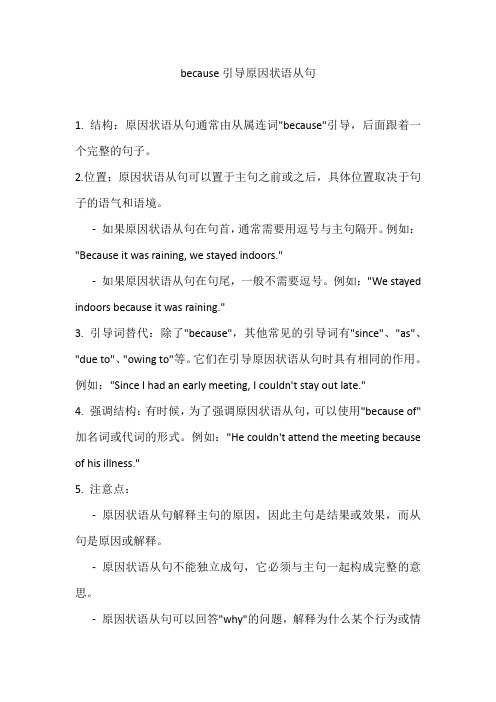
because引导原因状语从句1. 结构:原因状语从句通常由从属连词"because"引导,后面跟着一个完整的句子。
2.位置:原因状语从句可以置于主句之前或之后,具体位置取决于句子的语气和语境。
-如果原因状语从句在句首,通常需要用逗号与主句隔开。
例如:"Because it was raining, we stayed indoors."-如果原因状语从句在句尾,一般不需要逗号。
例如:"We stayed indoors because it was raining."3. 引导词替代:除了"because",其他常见的引导词有"since"、"as"、"due to"、"owing to"等。
它们在引导原因状语从句时具有相同的作用。
例如:"Since I had an early meeting, I couldn't stay out late."4. 强调结构:有时候,为了强调原因状语从句,可以使用"because of"加名词或代词的形式。
例如:"He couldn't attend the meeting because of his illness."5. 注意点:-原因状语从句解释主句的原因,因此主句是结果或效果,而从句是原因或解释。
-原因状语从句不能独立成句,它必须与主句一起构成完整的意思。
-原因状语从句可以回答"why"的问题,解释为什么某个行为或情况发生。
下面是一些例句,展示了"because"引导原因状语从句的用法:1、She didn't go to the party because she had to study for her exam.她没去参加聚会,因为她得准备考试。
英语连词的用法和总结
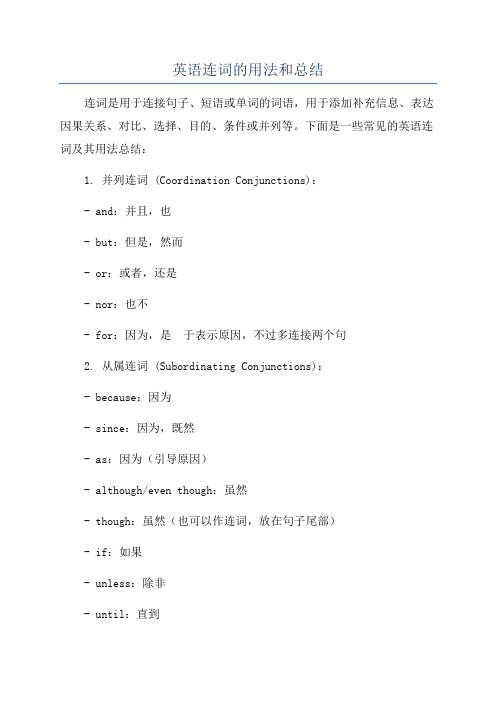
英语连词的用法和总结连词是用于连接句子、短语或单词的词语,用于添加补充信息、表达因果关系、对比、选择、目的、条件或并列等。
下面是一些常见的英语连词及其用法总结:1. 并列连词 (Coordination Conjunctions):- and:并且,也- but:但是,然而- or:或者,还是- nor:也不- for:因为,是⽤于表示原因,不过多连接两个句⽤2. 从属连词 (Subordinating Conjunctions):- because:因为- since:因为,既然- as:因为(引导原因)- although/even though:虽然- though:虽然(也可以作连词,放在句子尾部)- if:如果- unless:除非- until:直到- while:当⽤们做事的时候(⽤于时间)- after:在......之后- before:在......之前- when:当⽤个事件发⽤的时候- where:在哪⽤(地点)- that/because:可以引导定语从句- so that:以便,为了3. 连接副词 (Conjunctive Adverbs):- however:然而- therefore:因此- moreover:此外- thus:因此,这样- meanwhile:同时- furthermore:此外- also:也- besides:除此之外4. 原因/结果连词 (Cause and Effect Conjunctions):- for:因为- so:因此,所以- because:因为- since:因为,既然- as a result/consequently:结果,因此5. 对比连词 (Contrast Conjunctions):- although/even though:虽然- though:虽然- but:但是- yet:然而,但是- however:然而- on the other hand:另⽤⽤⽤6. 选择连词 (Alternative Conjunctions):- either...or:要么...要么- neither...nor:既不...也不- whether...or:是否...或者7. 目的连词 (Purpose Conjunctions):- so that:以便,为了- in order that:为了,以便8. 条件连词 (Condition Conjunctions):- if:如果- unless:除非以上仅为一些常见的英语连词的用法总结,并不包含所有连词。
because,since,as,for的区别(浓缩版)

Because, as, for, since的区别Because, as, for, since这几个词都是表示“原因”的连词,语气强弱依次为:because>since>as>>for;其中because, since, as均为从属连词(这里指用于引出直接或根本原因),引导原因状语从句;而for是并列连词(这里指用于引出非直接或根本原因),引导并列句。
并列连词[for]:这里指用于引出非直接原因或表可能性推断的连词the ground is wet ≈>(表可能)it rained last night从属连词[because, since, as]:这里指用于引出比较直接的原因或表必然性推断的连词it rained last night =>(表确定)the ground is wet语气强弱的界定/意义:强→弱直接原因非直接原因肯定性(一定因为…)不确定性(可能因为…)强调原因(从句)强调结果(主句)❶ because表示“因为”,用来表示最直接的因果关系或是听话人所不知道的原因,它所表达的语气是这四个词中最为强烈的,它所引导的原因状语从句一般(95%)要放在主句之后。
例如:(1)I stayed at home because it rained. 因为下雨我呆在家里。
(2)Because Lingling was ill, she didn’t come to school. 玲玲因病,没有上学。
(注: 以下两种情况只能用because来回答:1、用why来提问的特殊疑问句的回答,只能用because;He didn’t attend the meeting because he had too much work to do.2、在强调句中,只能用because。
It is because it rained last week that they put off the match.)❷for用作连词时,与because相似,用于引出非直接原因,表明可能性的推断或因果关系较弱的附加信息,因此for被看作并列连词。
- 1、下载文档前请自行甄别文档内容的完整性,平台不提供额外的编辑、内容补充、找答案等附加服务。
- 2、"仅部分预览"的文档,不可在线预览部分如存在完整性等问题,可反馈申请退款(可完整预览的文档不适用该条件!)。
- 3、如文档侵犯您的权益,请联系客服反馈,我们会尽快为您处理(人工客服工作时间:9:00-18:30)。
because是从属连词,接表示直接原因的从句,一般放在主句的后面,也可放在主句前面,它表示的语气最强,在回答why的问句时,必须用because。
例如:The swimming pool won't be open today because they're making repairs.游泳池今天不开放,因为他们在修理。
Why did you move to France?你们为什么搬到法国?Because my father found work in Paris.因为我父亲在巴黎找到了工作。
注意:在英语中用了because后,不可再用so。
since 意为"既然",表示对方已知的无需加以说明的原因或事实,语气比because弱,但是比as 强。
例如:Since we have no money, we can't buy that vase.既然我们没钱,我们就不能买那花瓶。
Since everybody is here, let's begin our party.既然大家都到了,那就开始我们的聚会吧!because是从属连词,接表示直接原因的从句,一般放在主句的后面,也可放在主句前面,它表示的语气最强,在回答why的问句时,必须用because。
例如:The swimming pool won't be open today because they're making repairs.游泳池今天不开放,因为他们在修理。
Why did you move to France?你们为什么搬4.过去分词由原形去字母e后,再双写后面的辅音字母加-en构成(*例外)hide-hid-hidden ride-rode-ridden write-wrote-written forg et-forgot-forgotten*5.过去分词由过去式加-n构成break-broke-broken choose-chose-chosen freeze-froze-frozen speak-spoke-spoken steal-stole-stolen6.完全不规则形式am /is-was-been are-were-been fly-flew-flown lie-lay-lain wear-wore-worn二.过去式与过去分词形式相同bring-brought-brought build-built-built buy-bought-boughtcatch-caught-caughtdig-dug-dug feel-felt-felt find-found-foundget-got-gothave /has-had-had hold-held-held keep-kept-kept leave-left-left lay-laid-laid lend-lent-lent lose-lost-lost pay-pa id-paidhear-heard -heard make-made-made mean-meant-meant me et-met-metsay-said-said sell-sold-sold send-sent-sent sit-sat -satsleep-slept-slept smell-smelt-smelt spend-spent-spent spill -spilt-spiltspit-spat-spat spoil-spoilt-spoilt stand-stood-stood swe ep-swept-sweptteach-taught-taught tell-told-told think-thought-thought win -won-wonunderstand-understood-understood wake-woke / waked-woken / wakedshine-shone / shined-shone / shined hang-hung / hanged-hung / hangedlearn-learnt / learned-learnt / learned三.原形、过去式与过去分词三种形式完全相同cost-cost-cost cut-cut-cut hit-hit-hit hurt-hu rt-hurtlet-let-let put-put-put set-set-set shu t-shut-shutread /ri:d/-read /red/-read /red/四.i-a-u变化形式begin-began-begun drink-drank-drunk ring-rang-rung sin g-sang-sungsink-sank-sunk swim-swam-swum五.过去分词与原形相同come-came-come run-ran-run become-became-become六.情态动词(没有过去分词形式)can-could must-must will-would may-mightshall-should1 AAA型(动词原形、过去式、过去分词同形)bet cast cost cut hit打 hurt伤害) let让 put放置read(读)read read rid免除set安置spread (伸展/传播) spread spreadquit放弃quit/quitted,quit / quittedspit吐出spat / spit, spat / spitwet淋湿wet / wetted ,wet / wetted2 AAB型(动词原形与过去式同形)beat(跳动)beat beaten(3) ABA型(动词原形与过去分词同形)become(变成)became become come(来)came comerun(跑)ran run(4) ABB型(过去式与过去分词同形)bend使弯曲bent,bentbring拿来brought,broughtbuild建造built,builtburn燃烧burnt / burned,burnt / burnedbuy买bought,boughtcatch捕捉caught,caughtdeal分配dealt,dealtdig(挖)dug dugdream做梦dreamed / dreamt,dreamed / dreamt feed喂fed,fedfeel触摸felt,feltfight作战fought,foughtfind找出found,foundflee (逃跑) fled fledget(得到)got gothang(吊死)hanged hangedhang(悬挂)hung hunghave / has有had,hadhear听到heard,heardhold(抓住)held heldkeep保持kept,keptlay (产卵) laid laidlead引导led,ledlearn学习learnt / learned,learnt / learned leave离开left,leftlend借贷lent,lentlight点着lit / lighted,lit / lightedlose遗失lost,lostmake制作made,mademean表…意思meant,meantmeet遇到met,metpay支付paid,paidprove证明proved,proved / provenquit放弃quit/quitted,quit / quittedrebuild改建rebuilt,rebuiltretell复述retold ,retoldsaw锯sawed ,sawed / sawnsay说said ,saidseek寻觅sought ,soughtsell卖sold ,soldsend送/寄sent ,sentsew缝合sewed ,sewn / sewedshine发光shone ,shone 擦亮shined ,shinedshoot放(炮)shot ,shotsink下沉sank / sunk,sunk / sunkensit坐sat,satsleep睡slept ,sleptsmell发出气味smelt ,smeltsow种植sowed ,sown / sowedspell拼写spelt / spelled ,spelt / spelledspend花费spent ,spentstand站立stood ,stoodsweep打扫swept ,sweptspit吐出spat / spit, spat / spitstick (粘贴/刺) stuck stuckteach教taught ,taughttell告诉told, toldthink思考thought ,thoughtunderstand了解understood ,understoodwet淋湿wet / wetted ,wet / wettedwin获胜won, won(5) ABC型(动词原形、过去式与过去分词三者不同形)arise出现arose,arisenawake醒来awoke,awaked / awokenbe(am / is / are)是was / were,beenbegin(开始)began begunbite咬bit,bittenblow吹blew,blownbreak打破broke,brokenchoose选择chose,chosendo / does做did,donedraw画,拉,拖drew,drawndrink(喝)drank drunkdrive驾驶drove,driveneat吃ate,eatenfall掉落fell,fallenfly飞flew,flownforbid禁止forbad,forbiddenforget忘记forgot,forgottenforgive原谅forgave forgivenfreeze结冰froze frozengive给gave,givengo去went,gonegrow成长grew,grownhide(躲藏)hid hiddenknow知道knew,knownlie躺lay,lainmistake误认mistook,mistakenmisunderstand误会misunderstood,misunderstoodride骑rode ,riddenring(铃响)rang rungrise上升rose, risensee看saw seenshake摇shook ,shakenshow显露showed,shownsing唱歌sang ,sungspeak说spoke ,spokenspring跳跃sprang / sprung ,sprungsteal偷stole ,stolenswim游泳swam ,swumtake拿took, takentear撕裂tore ,tornthrow投/扔threw, thrownwake醒着woke / waked ,waked / wokenwear穿着wore, wornwrite书写wrote, written动词原形中文意思过去式过去分词can 能 couldmay 可以 mightshall 将 shouldwill 将 would(5)现在分词(也可总结为规则以ie结尾改为y + ing)die(死)dying dyinglie(躺,平放,说谎)lying lyingtie(系,打结)tying tying。
